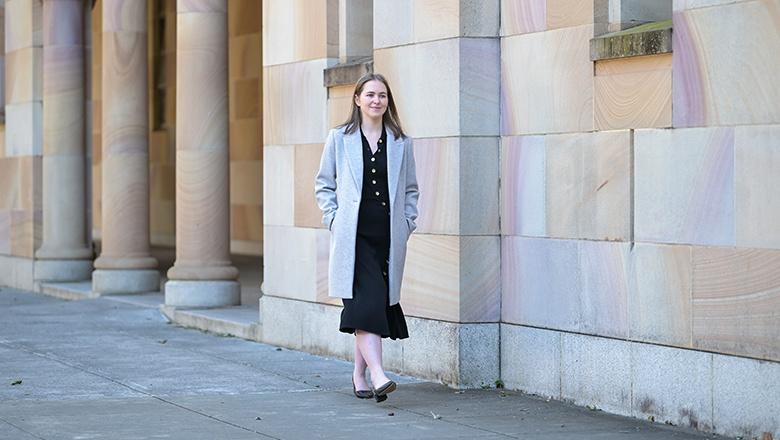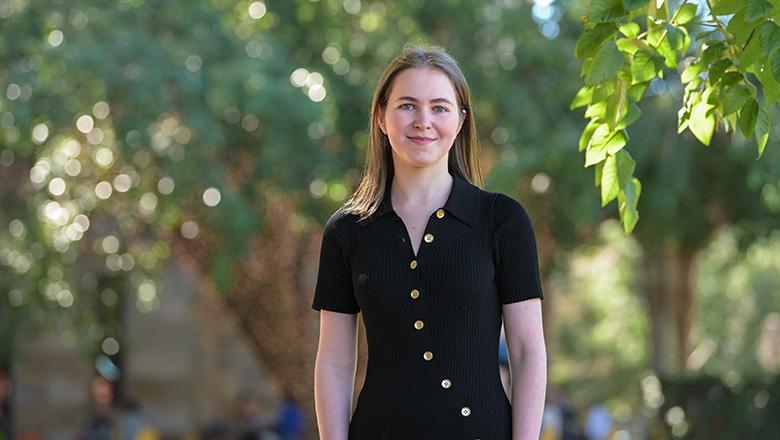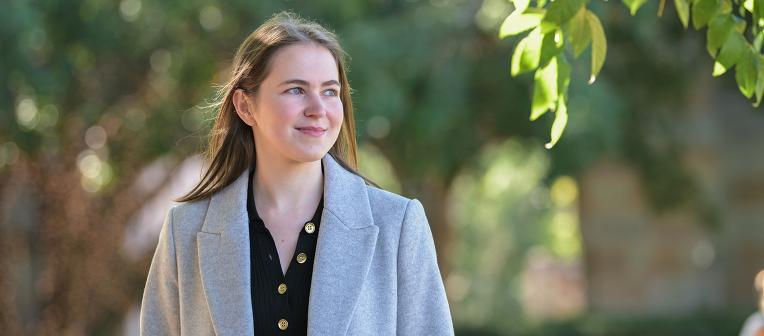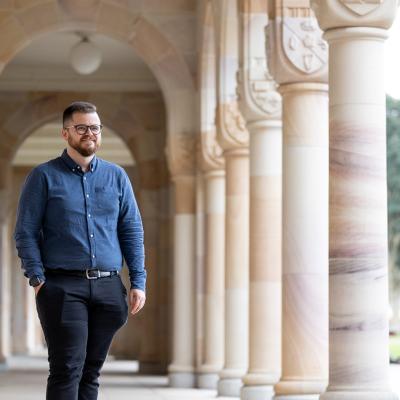The housing crisis has painted a bleak picture for young Australians, leaving many wondering ‘will Gen Z be able to afford houses?’.
While we don’t have a clear answer yet, there are young people working busily behind the scenes, hoping to lay the foundations of a brighter future for their generation.
Sophia Dow is a UQ Bachelor of Regional and Town Planning (Honours) (renamed Bachelor of Urban Planning (Honours) in 2005) student conducting research into young-people-led households. She’s collecting data and investigating trends on where young people live in Brisbane and how this has changed over time as the housing crisis has progressed.
Sophia will present her research as a thesis at the end of the year before she graduates. The insights she derives from this research have the potential to influence policymakers to plan for more affordable and accessible housing for young Australians.
The Gen Z housing crisis isn’t going to be solved overnight, but with passionate and determined students like Sophia working towards change now, things might be looking up.
What inspired Sophia’s research?
News headlines and social media posts are strong indicators that the young people housing crisis is on many people’s minds. But it isn’t just this topic’s notoriety that inspired Sophia to conduct her own research in the area.
Sophia’s thesis supervisors (who are also her teachers), have keen interests in housing and demographics. They’ve influenced Sophia throughout her undergraduate studies in urban planning and have inspired her to do something about the housing challenges her generation faces.
“I’ve found that what really underpins UQ’s planning program are the principles of good planning and sustainable development,” Sophia says.
“The theory, trends, history and practices of planning that we look at instil those values and knowledge to shape us into planners that will create good outcomes for places and people.”
“Our lecturers and tutors encourage us to think critically about complex planning challenges and recognise the role of planning as critical in shaping how people live their lives.”
Sophia’s internship and consequent work with Wolter Consulting Group have also influenced her research interests.
“Wolter Consulting Group is a proud supporter of the Yes in My Back Yard (YIMBY) movement across Queensland and Australia, particularly the YIMBY Qld initiative,” she says.
The YIMBY movement believes in more equitable and sustainable housing in various forms. It challenges the aspiration for traditional standalone houses with big backyards, which aren’t accessible to everyone. Instead, YIMBYs advocate for more housing diversity and density (like apartments) to improve liveability for a wider range of people in our growing cities.
“Through YIMBY Qld, I’ve had the fortune of contributing to and witnessing advocacy for better development and planning outcomes for some of the current challenges we face, not just within the industry, but that extend to the broader community.”
With these learnings and experiences in mind, Sophia set out to investigate ways she could play her part in altering the trajectory of the young people housing crisis.

Researching young-people-led households
Young-people-led households are predominantly made up of, and headed by, young people. This can include share houses as well as young families or couples living on their own.
Sophia’s research analyses 3 age groups of young-people-led households: 20-24, 25-29, and 30-34. She uses census data to look at where these households are concentrated and how this has changed in the Greater Brisbane region over time.
“From these findings, there’s been some interesting patterns emerging, particularly for those 2 younger age groups,” she says.
“It’s showing that there’s increasingly higher concentrations of young heads of households on Greater Brisbane’s outskirts, especially in some major master planned communities like Yarrabilba.”
As housing pressures increase, young people are shifting further away from Brisbane’s inner city in the hopes of finding more affordable living arrangements.
The next step in Sophia’s research is to link trends in where young-people-led households are located to:
- types of housing (apartments, standalone houses, townhouses, etc.)
- tenure (renting or owning)
- how much residents are paying in rent or mortgage repayments
- household income
- proximity to infrastructure (highways, public transport hubs), institutions (universities, training colleges) and amenities (shopping centres, childcare facilities, healthcare, public libraries).
“Linking these additional aspects will provide further depth to my research,” says Sophia.
“It will allow me to understand not just where young heads of households are located, but as a collective who they are and the socioeconomic and locational attributes that may be contributing to their housing circumstances.”
Influencing the future of housing
Sophia’s hopes for her thesis reflect that of any budding researcher: to be published in an academic journal. This way, she can influence key decision-makers in government and private industry, who have the power to ease housing challenges for young people.
“With intergenerational equity a rising topic within the industry, the experiences and disenfranchisement of young people cannot be ignored, particularly for an issue as pervasive as housing.”
“I think the ultimate findings from the research will point to some key implications for reform or change in housing and planning policy, particularly encouraging a proactive and future-focused mindset for policymakers,” Sophia says.
Sophia anticipates that her research findings may spark further conversations and hopefully inspire others to explore what needs to change to make housing more accessible for Gen Z, Alpha, and other generations to come.
“Policymakers, developers, planners and researchers need to think critically as an industry on how we move forward to create places that are affordable, accessible and equitable for young people.”

What can be done about the housing crisis?
Based on Sophia’s studies, research and experience so far, she believes these 3 key changes could help turn the tide on the housing crisis for young people.
Want to be part of the conversation to help ease housing challenges for young people? Explore UQ’s architecture, design and urban planning programs today.





